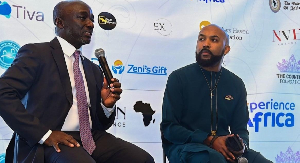 Ghana’s Former Ambassador to China, H.E. Edward Boateng (L)
Ghana’s Former Ambassador to China, H.E. Edward Boateng (L)
Ghana’s Former Ambassador to China, H.E. Edward Boateng, delivered a powerful and inspiring message to African students studying abroad, emphasizing their critical role in shaping Africa’s future.
Speaking at the Georgetown University African Business Dialogue in the United States, Amb. Boateng called upon students to adopt a global mindset while staying deeply rooted in the realities of their home countries and local communities.
He urged them to actively contribute to Africa’s development, asserting that the key to change lies in their hands.
“You cannot sit in Washington D.C. and expect Ghana or Ethiopia to become like Washington D.C.,” Amb. Boateng remarked. “Real change requires a deep understanding of Africa’s local context and active engagement. You must be ready to get your hands in the game,” he advised the students.
This statement followed his broader call to reclaim Africa’s narrative, telling the continent’s story from an African perspective. Amb. Boateng emphasized that the common depiction of Africa as a land of lost dreams must be rejected.
“Africa is a continent of possibilities and untapped opportunities,” he asserted, “and if she is to reach her full potential, it will require the dynamism of its youth.”
He stressed that African students abroad must return home equipped with the knowledge and experiences they gain globally, using these tools to drive the progress needed, rather than waiting for change from afar.
Their active involvement in Africa’s growth is essential for the continent’s future.
Ambassador Boateng urged students to rise above the negative portrayals of Africa, especially in Western media, and to recognize the significant political and economic strides Africa has made over the past 25 to 30 years.
“Now is your moment of opportunity,” he declared. “Seize it and play your part, no matter how big or small. Be part of the solution, and find ways to contribute to Africa’s progress instead of succumbing to pessimism. Africa will only improve when her children take an interest in the opportunities she has to offer.”
One such opportunity, he highlighted, is the African Continental Free Trade Area (AfCFTA), which aims to create a single market for goods and services across the continent. AfCFTA, he said, offers an unparalleled platform for young people to harness their talents, innovate, and export their skills across Africa.
He described this initiative as one of the most significant steps toward economic integration, which can only succeed with the energy and creativity of Africa’s youth.
Ambassador Boateng also encouraged students to consider stepping into political and leadership roles.
He stressed that Africa’s future depends on leaders who are not only skilled but also have a conscience—leaders who are dedicated to ethical governance, good management, and sustainable development. Many of Africa’s institutions suffer from poor leadership and inexperienced management, which hampers their progress.
By becoming thinkers, innovators, and implementers, African students can guide their countries toward lasting success.
He drew on examples from Asia, pointing to nations like China, Singapore, South Korea, and Vietnam, where visionary leadership has driven extraordinary economic growth and technological advancements over the past 40 years.
These countries’ ability to blend traditional values with modern innovation has been key to their success, and Africa, he noted, could follow a similar path with the right leadership.
Turning his attention to Ghana, Ambassador Boateng highlighted the importance of initiatives like the Year of Return and its continuation, “Beyond the Return.” He expressed concern, however, that “Beyond the Return” has become more of a festive occasion than a serious effort to drive investment into Ghana and, more broadly, Africa.
In his view, the program should be focused on attracting long-term investments and facilitating the relocation of African-American youth who seek to reconnect with their roots and contribute to Africa’s development.
“Ghana is not just a party destination in December,” he said. “It is the ‘Mecca’ of African emancipation and independence, and we must treat it with the respect and seriousness it deserves.”
In closing, Ambassador Boateng urged African students to use their global experiences to enrich their home countries.
He advocated for a model of development that respects local traditions while embracing modern innovation.
Drawing on the success of returning Asian diasporas—many of whom studied in the U.S. and Europe—he noted how they have transformed their countries by combining global knowledge with local values. Africa’s youth, he emphasized, have the potential to do the same.
“The momentum of change is now on Africa’s side,” Amb. Boateng declared. “The continent’s future lies in the hands of its youth, particularly those studying abroad who have the potential to become catalysts for transformation.”
He concluded with a powerful message: “By embracing hard work, ethical values, good management, leadership, and integrating global insights with local realities, African students from the diaspora can play critical roles in shaping a brighter future for their countries. It won’t be easy, but the journey to transforming Africa starts with you. Now is your moment—become the catalysts for change.”